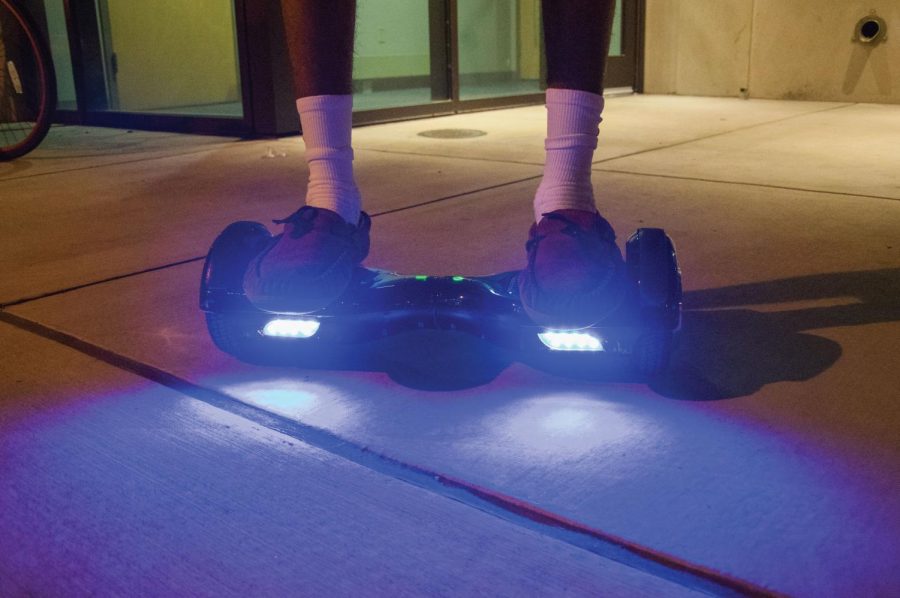Hoverboards banned on UHDS property
February 3, 2016
Officials from Oregon State University announced a policy change that effectively prohibited the use or presence of hoverboards in all on-campus residence halls and dining halls.
The two-wheeled self-balancing scooters, also referred to as smart boards, have been the subject of much media and legal attention in the past year. Reports of malfunctions and injuries related to the devices have surfaced across the globe.
According to Jill Childress, the University Housing Dining Services’ assistant director of Student Conduct and Community Standards, the UHDS received information from the National Fire Protection Association (NFPA) outlining the fire safety dangers of hover boards in December.
“We were concerned about the health and safety impacts, loss or damage to property, and serious disruption that a fire in a residence hall could have on our communities, so we made the decision to ban them from UHDS property,” Childress said in an email.
The lithium-ion batteries used to power some hoverboards have been criticized by media outlets where videos show them bursting into flames and setting other objects on fire. One known fatal hoverboard-related accident in London was reported by the Daily Mail back in mid-December.
More than 60 major airlines have prohibited any transportation of hoverboards on their planes, including American Airlines, Delta Airlines and United Airlines. Retailer Amazon has also stated that anyone who has already bought one through their service and would like to return it will receive a full refund.
As of last week, the U.S. Consumer Product Safety Commission has stated that they are conducting an investigation into these products. The Corvallis Fire Department has issued guidelines and warnings regarding hoverboards for anybody in the city of Corvallis who is considering purchasing one.
“Some of the basic precautions for folks are to not charge the unit unattended,” said Jim Patton, a fire prevention officer with the Corvallis Fire Department. “Don’t charge them on or near any combustible material, and don’t charge them overnight, while you’re sleeping. Be attentive when they’re on charge.”
Students on campus generally do not feel affected by the change in UHDS policy.
“I don’t have a hoverboard, so I don’t think it really impacts me at all,” said C.J. Brill, a sophomore in business. “I’ve seen a couple. I don’t think there’s really that many, I don’t know why they would ban them. I don’t see how it’s different from a bike.”
According to Cheyenne Dickey, a freshman in microbiology, the hoverboards were never a bother in the first place, and some people in her dorm were happy about it, but she did not feel very much affected.
According to Jesse Guile, a freshman in pre-mechanical engineering, it’s a good idea. “I don’t think there should be skateboards, scooters, any of those types of things in the dorms and halls. They’re way too noisy, especially when people are trying to get work done. I have a friend who has a hoverboard, but he doesn’t have it with him at OSU, it’s back home at Salem, so he just doesn’t bring it here.”
As far as the reason for the Corvallis Fire Department publishing hoverboard-specific counsel to residents of Corvallis and Oregon State, Patton said that the majority of hoverboard owners tend to be of college age, and that ensuring students’ safety is of great importance to both the university and the fire department.
“One of the other recommendations is buying a reputable unit, not one that’s from a company that you’ve never heard of,” Patton said. “Units from companies that are more reputable and known are tending to be more reliable…. It’s not a catastrophic epidemic at this point, but it is certainly a concern, and it helps to be cautious and attentive.”
The future of this policy will depend upon further testing from reputable sources. Childress stated in an email that whether the ban could extend to be campus wide would not be determined by anybody in UHDS. However, she hinted that the ban could be lifted if the safety of more hoverboard models were proven.
“For UHDS, we review our policies on a typically annual basis with input from partners like Jim Patton with the Corvallis Fire Department,” Childress said. “If we receive additional information about hover boards that indicate that they meet safety guidelines and are a reduced risk, and if it fits with broader university policies and expectations, then they could be allowed again in the future.”
























































































































